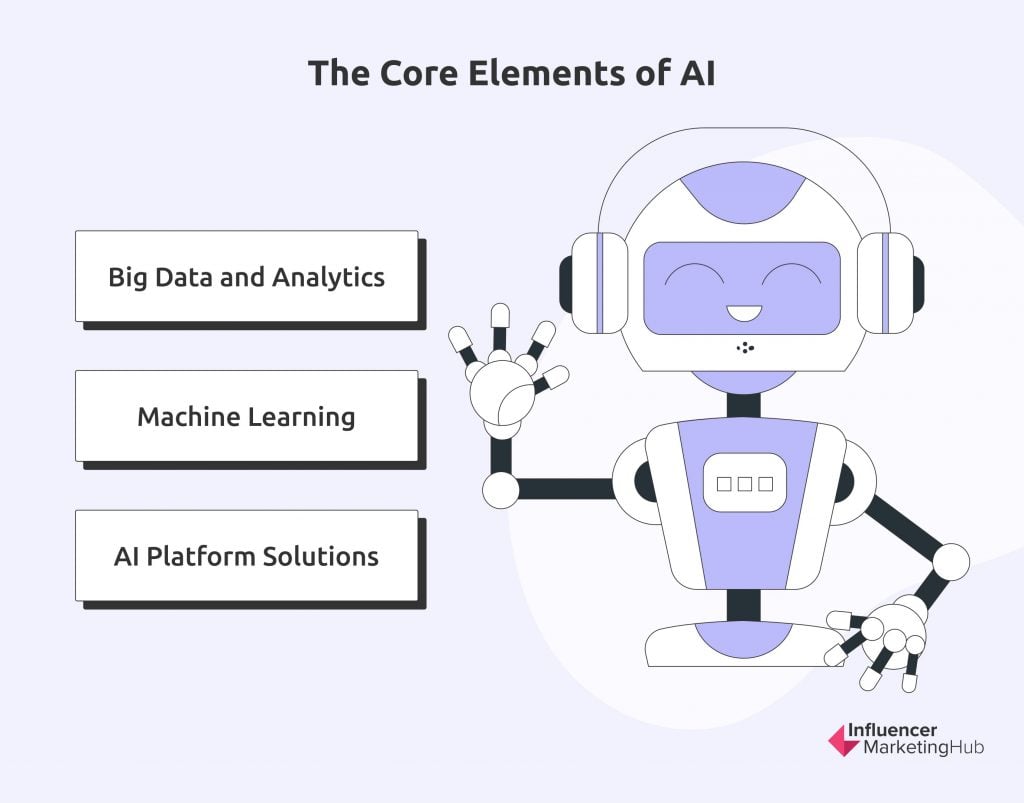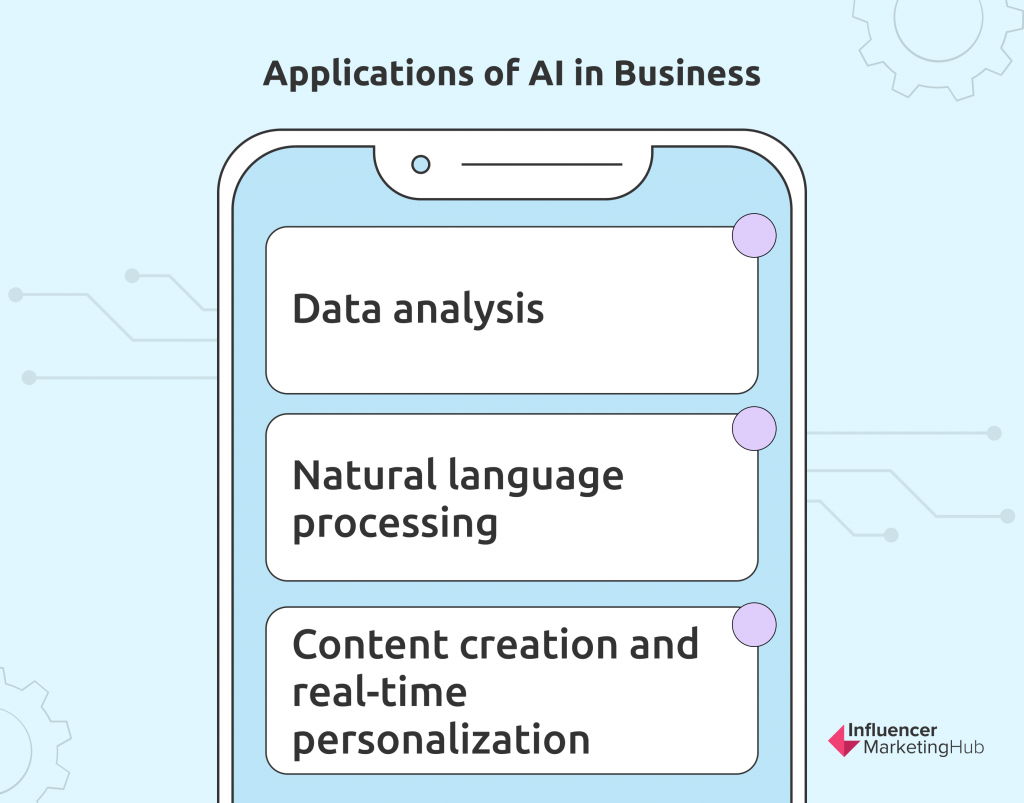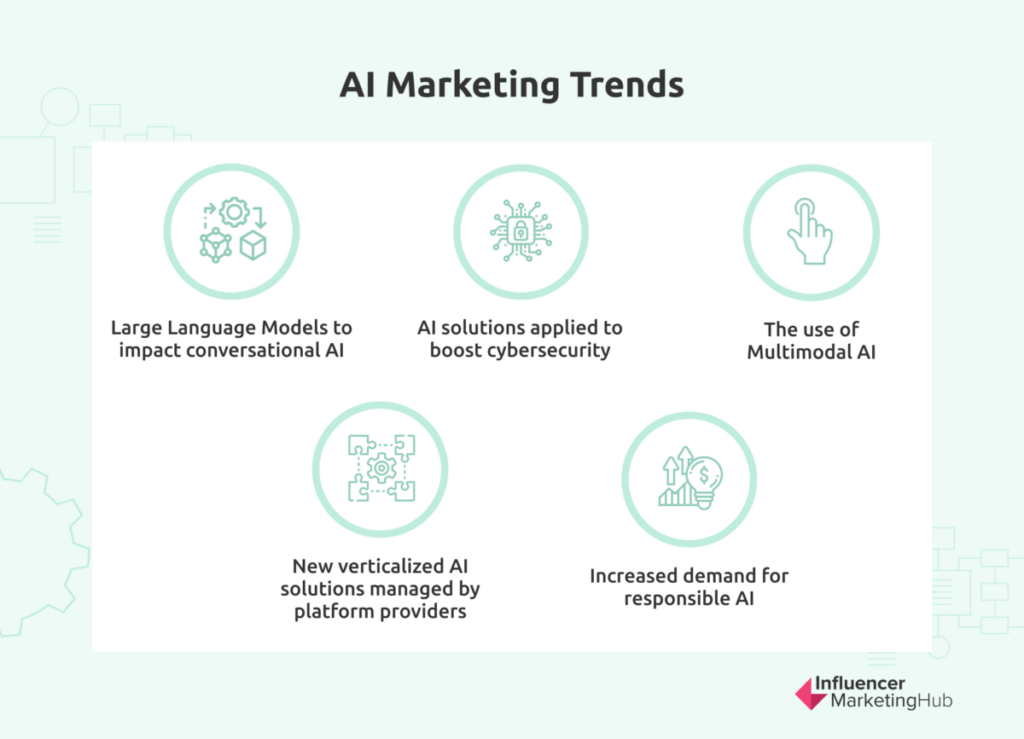Artificial intelligence is an absolute necessity if you are to keep the lifeblood of your business flowing. In today’s competitive business landscape, getting as close to the minds and hearts of your customers is the only way to stay afloat and thrive.
It is crucial for businesses today to leverage AI in formulating more strategic marketing plans. Here, we give you a comprehensive guide on what AI marketing is, what its real-life applications are, and how it impacts various industries. We also give you a peek into the AI trends that you should watch for this 2024.
The Ultimate Guide to AI Marketing in 2024:
The Use of AI in Business
Artificial intelligence allows marketers to gain on-point insights into the preferences and behavior of their customers. AI gives them information on everything else that has to do with how they consume products and services. It lets marketers in on the kind of personalized experiences that delight customers so much that they continue to purchase and patronize businesses.
AI is critical in driving business growth and profitability as well as in promoting customer loyalty. As businesses are able to match and even exceed customer expectations in terms of product quality, service delivery, and touchpoint experiences, sales revenues continue to flow in. It is almost guaranteed that truly satisfied customers will be more than happy to keep buying from businesses that provide high-quality products and services. To boot, they are also more likely to share their delightful sales and service experiences with their family and friends and to convince them to give the business a try too.
What Is AI Marketing?
Marketing using artificial intelligence effectively automates data collection and behavioral targeting to help businesses achieve their goals. As it is applied in digital channels, it takes away the element of human bias. The information gathered is considered to be more objective and realistic in revealing actual consumer preferences and behavior in the online realm.
Data gathering and processing using AI are done by computers using programmed algorithms. Information is gathered from consumers’ behavior as they peruse content, respond to online and affiliate marketing offers, and react to content and social media posts. Taking it further, AI automatically reaches out to customers or prospects who exhibit specific behavior. This kind of behavior targeting is made possible with the use of tech tools, platforms, and analytics.
When time is of the essence, AI marketing is the best way to go. Especially in the online world where your competitors are likely to be present 24/7 and customers are looking for immediate answers and solutions to their needs, you cannot dilly-dally and spend hours culling and analyzing information. You need to be able to give them what they want and need right there and then, and you can only do this with AI.
AI tools can immediately use whatever data they collect and communicate using tailor-fit messages right at the point of contact without wasting any time at all and without the need for a marketing personnel to trigger the response. It’s a responsive and efficient way to deal with your customers and ensure satisfaction. Among other uses of AI marketing include data analysis, media buying, content generation, natural language processing, automated decision-making, and real-time personalization.
The Science of AI
Artificial intelligence makes use of scientific models. It is not arbitrary at all. In cognitive science, AI takes the principle behind the perception-reasoning-action cycle. Translated into AI terms, this principle takes the form of the collect-reason-act cycle.
Collect refers to all activities that have to do with capturing customer data, both online and offline, and saving them into databases. The next step is to reason where AI transforms data into intelligence or valuable insight. AI then acts based on the intelligence gathered and sends customer communication with the intention of prompting and incentivizing the customer to perform a desired action—in most cases, to make a purchase.
Artificial intelligence also involves machine learning or ML, a study that takes a closer look into computer algorithms and builds models based on collected data. The models that are built with ML allow applications to make predictions and decisions. ML is thus also often called predictive analysis.
Some of these models make use of data and studies of neural networks to simulate how the biological brain works in probabilistic reasoning. The subset of ML that’s used in AI involves computational statistics. Other related studies include mathematical optimization and exploratory data analysis. Studies on ML and AI are still ongoing, and the relationship between the two has yet to be fully understood.
Another probabilistic model that is used in AI is the Bayesian network. This graphical model identifies a set of variables and plots conditional dependencies in what is a directed acyclic graph or a DAG. It essentially predicts outcomes by computing the probability that an event will occur due to any one of a number of possible known causes. Algorithms are likewise used in making inferences and generalizations towards solving decision problems.
These scientific approaches allow for more efficient behavioral targeting through AI. The use of various AI technologies puts these approaches to action and takes human bias out of the equation. Such an approach is also aptly referred to as Algorithmic Marketing.
Core Elements of AI
Several key elements are necessary to effectively make use of artificial intelligence in formulating marketing plans and solutions. Data science has to be translated into more relevant action and more effective execution. What seemed to be a tedious and time-consuming task in collecting, processing, and analyzing data decades ago can now be accomplished by AI in minutes and without breaking a sweat.

These elements make AI truly essential, critical even, in serving today’s highly demanding consumer market:
Big Data and Analytics
There is an ocean of data out there in the digital world. Marketers have to cull all these data and make sense of them to be able to use them in their marketing campaigns. Understanding the data could effectively lead to more accurate attribution of value across channels and to more responsive products and experiences for customers in the most timely manner.
The challenge is for marketers to keep themselves from drowning in the overwhelming amount of data, most of which does not really hold any value for them. They should be able to focus their efforts towards more worthwhile data that are most relevant to their business.
Using analytics to process the collected data will give marketers better insight into the perception and behavior of their customers and prospects. Campaigns are consequently more spot-on and are likely to result in higher engagement and conversion rates.
Machine Learning
Driven by AI, information can be analyzed using computer algorithms. Both historical data and new information are correlated to make decisions that are most likely to yield the best results.
Using the information that it already has about the customers or prospects, AI can automatically serve content that is predicted to have the highest probability of success given specific customer or prospect behavior or action.
AI Platform Solutions
Running AI using an expansive, and often enterprise-wide, platform effectively consolidates data collection and analysis. These platforms are able to provide solutions more efficiently and intelligently within a short period of time.
With the use of AI platform solutions, operational processes are streamlined, simple tasks are automated, and expensive activities are eliminated. All of these ultimately lead to being able to provide the most relevant solutions and the best customer experience possible.
Applications and Examples of AI Marketing in Modern Businesses
From data collection to analysis, AI can provide relevant marketing intelligence for marketers to serve their customers best. With the use of a central AI-powered platform, it would be easier to gain such market intelligence so that marketers are able to quickly make decisions that are data-driven.
Marketers are able to reach out to more of their target audience at the right time and with the most effective tailor-fit messages that are optimized to prompt the desired action. Breaking it down further, here are some examples of how AI marketing is used in modern businesses:

1. Data analysis
This is at the core of AI. Predictive analytics is applied to data that you get not only from traditional metrics, but also from consumer engagement, inbound communications, new business generation, and any other inputs from other communication channels. Among the metrics that you would likely come across include clicks and views, purchases, time-on-page, and email responses. From these, marketers gain actionable insights that enable them to make data-backed decisions and tweak their campaigns accordingly.
To put it simply, the algorithms used in AI not only predict outcomes, but also help marketers act on the predicted outcomes. Predictive analysis indicates possible consumer behavior based on past data, and prescriptive analysis consequently points marketers to where they need to go and what they need to do to improve their standing in their customers’ favor. This kind of technology will boost your strategy considerably, moving from simple automation towards “proposing” recommended action and even implementing strategic action.
2. Natural language processing
This is applied in voice and image recognition technologies. AI is now actively used in speech recognition and voice search functionalities across different platforms, products, and services. A good number of businesses tap the capabilities developed by major IT giants like Google, Apple, and Amazon rather than developing their own technology.
With virtual personal assistants driven by AI technology, voice and image search optimized sites are likely to gain a good volume of organic traffic of customers and prospects with high purchase intent. Siri and Alexa as well as other speech-enabled technologies are increasingly reliable in directing consumers towards the products and services that they are looking for. Some examples of success in AI marketing are Domino’s and Patron Tequila’s voice-activated ordering system through Alexa and their own voice-bots.
3. Content creation and real-time personalization
It used to be that there were people dedicated to crafting and serving up content to a company’s target market. That is not a big concern if you are only talking about a single generic content that you simply copy-paste in reply to an inquiry from a customer or prospect. Today, however, it is all about getting personal in your online engagements and interactions.
You can certainly hire people to “man” your customer touchpoints, but you will gain efficiencies when you make use of AI for content creation and personalization. This, however, is not always foolproof and effective. High-quality content is still best produced by the marketers with AI providing valuable data insights and analytics for smart and fast content creation.
AI-generated content churned out by writing programs has seen success in some industries like financial services and sports. In most cases, AI-curated content works more efficiently in serving up “recommended” content based on historical and present customer data. Home Depot and Lufthansa have utilized this kind of AI technology in creating personalized experiences for their customers.
Why You Need to Leverage AI in Marketing
Leveraging AI is an excellent way for marketers like you to gain valuable insight into your customers’ minds to understand them better and enhance their experience with your brand. It is the only way for you to keep your lifeblood flowing and consequently increase your ROI on every customer touchpoint.
AI allows you to understand your market better so you can create unique content, formulate personalized marketing campaigns, and offer more responsive smart solutions to their needs. All these are achieved without adding to the load of your workforce.
As technology effectively mimics how the human brain works, AI allows you to tap into a rich data source in order to considerably improve the way you serve and satisfy your customers. The enhanced customer experiences create a bond between your company and your customers that’s strong enough to increase consumption and nurture loyalty. More meaningful interactions and lasting relationships with your customers will result from strong AI systems—further resulting in long term profitability for your business.
AI Marketing Trends to Watch Out For in 2024

Artificial intelligence and related technologies are still developing, and there is a lot of room for growth. More companies are investing and upgrading their IT resources and capabilities—and AI is definitely part of the grand scheme of things. It is predicted that AI will take a huge chunk in marketing data analysis and data science tasks. Marketing teams will continue to leverage AI solutions in driving their profitability targets.
More relevant marketing metrics will be available to help marketers put value on their campaigns more accurately. These insights will continue to spur business growth owing to more responsive solutions and more strategic marketing initiatives. Among the trends that are seen to emerge in 2024 are:
1. Large Language Models to impact conversational AI
In the next few years, we see Large Language Models (LLM) having an impact on conversational AI. As LLMs are trained on massive datasets in the terabytes and multiple parameters in the billions, they will define the next-generation conversational AI. For marketers, this means more adaptive conversational tools that can enhance customer engagement.
2. AI solutions applied to boost cybersecurity
The accuracy of AI Marketing relies on how well models are trained. Model training requires the use of massive datasets, which hackers can potentially access by reverse-engineering AI systems. These hackers also use advanced tools to spot and penetrate weaknesses in the security of corporate systems. To avert these attacks, AI solutions will also need to be implemented in cybersecurity. This will help deter hackers from accessing and manipulating data used in model training.
3. The use of Multimodal AI
Moving from single modal AI, multimodal AI will combine conversational AI models with visual modalities. Google’s Multitask Unified Model (MUM) is a familiar example of how this trend impacts AI marketing. Through Google MUM, the search experience is enhanced through the T5 text-to-text framework where search results are based on contextual information from multiple languages.
4. New verticalized AI solutions managed by platform providers
Platform and cloud providers have started to deliver tailored AI solutions for specific use cases. For instance, Amazon and Google offer vertical integration through Connect and Contact Center AI respectively. Both enable bot-driven conversations, intelligent routing, and automated assistance, features that marketing teams can leverage to improve customer experience during support.
5. Increased demand for responsible AI
As the use of AI becomes prevalent, the demand for its responsible use is also bound to increase. In 2024, we expect responsible AI to be one of the defining AI trends. There is still some mistrust in the use of AI because of issues that undermine privacy and data control including facial recognition and access to confidential information. The challenge for marketers today is balancing the use of data for the personalization of services with ensuring the ethical use of the same data. With responsible AI in marketing, businesses commit to using sensitive data only when necessary and beneficial to their customers.
The Time to Adopt AI Marketing Is Now
It is essential for marketers today to quickly adopt AI technology solutions in order to improve customer experience and enhance operational efficiencies. Through AI, marketers will have a deeper and more comprehensive understanding of the perceptions and behavior of their target audiences. AI will lead to more optimized marketing campaigns with a greater probability of conversions and revenue generation.
Artificial intelligence is here to stay, but it does not solely hold the key to capturing the hearts of your customers. There is still some value to the human touch and emotional marketing. Marketers should be able to wield some amount of agility when it comes to switching from AI to high-touch “human” marketing. Together, these two approaches can bring the best results.
Frequently Asked Questions
How is AI used in marketing?
AI is primarily used in behavioral targeting in marketing. Predictions are made using historical and current data about the customers or prospects to determine what content or communication to serve. Prescriptive analysis of the information gathered through AI can also be used to create offers and marketing campaigns that are tailor-fit to the company’s target market.
What businesses or industries can benefit from AI Marketing?
Any business that operates in the digital marketplace will benefit from AI marketing. Some tools of AI marketing, however, will be more suitable for specific industries. AI content generation, for instance, is best suited for financial services and sports industries.
How can marketers implement responsible AI?
Start by removing bias in data collection by focusing more on interest-based and behavioral variables instead of relying solely on demographics. Then, ensure transparency by letting consumers know about your AI models and the training data you use. Give your customers control over the data that they want to share by enabling personal preferences. To earn trust and encourage consumers to share their data for your AI marketing, inform them of the benefits they can gain by sharing their data. These benefits can include personalization and better user experiences on your site.


